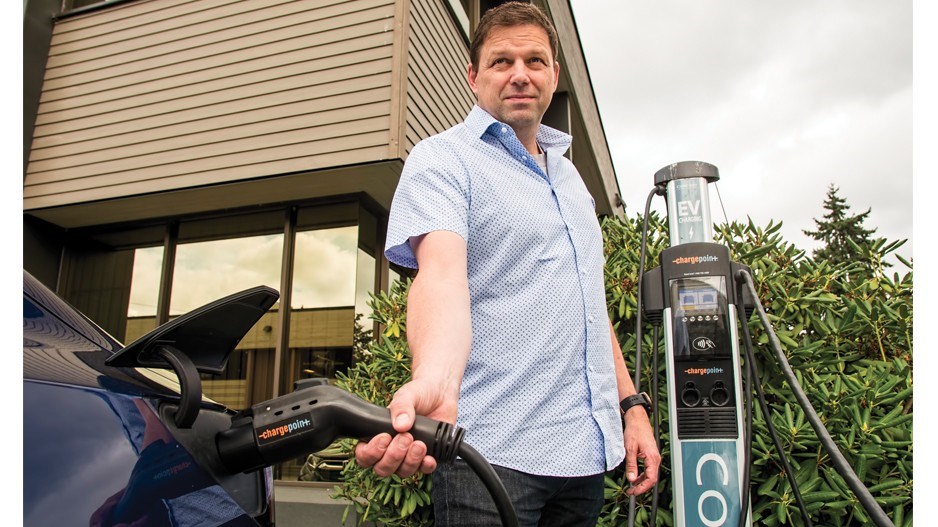Uli Laue has wanted to buy an electric vehicle (EV) for nearly a decade.
While the provincial government, early on, offered rebates of up to $5,000 to encourage EV purchases, prices remained outside Laue’s budget.
An even bigger hurdle for Laue was that the parkade in his East Vancouver condominium had no charging outlets.
With the provincial government’s rebate incentive rising to a maximum of $8,000, and some models of electric vehicles having prices below $50,000, the Salt Spring Coffee COO decided earlier this year to place a $500 deposit on a Hyundai IONIQ 5, which is likely to arrive early next year.
Laue's condominium building still lacks charging outlets, but he is on the strata corporation's working group tasked with investigating the feasibility, and costs, of installing a single charging bay that could charge up to two vehicles at the same time.
If no charging is possible at Laue's home when his EV arrives, he plans to charge the car at Salt Spring Coffee's head office in Richmond, during his work day.
He anticipates that his car could operate for up to two weeks on one charge.
Many potential EV buyers have yet to shed what industry insiders call “range anxiety”: the fear of being left stranded because the battery has died.
This is despite the Fraser Basin Council’s advocacy group Plug In BC having a website that has a detailed map of charging facilities in the province.
Slowly, however, British Columbians are gaining faith that charging their EVs will not be a problem.
EVs represent about 10% of new car and truck sales in B.C., according to the B.C. government.
The City of Vancouver estimates that in the province’s largest city, EV sales account for up to 17% of car and truck sales.
The city in 2011 started requiring 20% of parking stalls in proposed new buildings to have charging infrastructure. Council later voted to bump that percentage up to 100%, starting in 2019.
In July, council voted to require most types of new non-residential buildings to install charging infrastructure in 45% of parking stalls, as well as 100% of car-share stalls. The policy applies to 100% of parking stalls at new hotels.
Many if not most condominium dwellers, however, still live in buildings that have parkades with no electrical outlets available to charge electric vehicles.
For strata corporations wanting to upgrade parkades to install electrical outlets next to all spots, the cost could be several thousand dollars, or more, in special assessments for each strata unit.
“Most strata corporations don’t go down the road of doing the upgrade for electrification because it generally affects one or two people, at this point, and the investment can be significant,” Condominium Home Owners Association of BC executive director Tony Gioventu told BIV.
In addition to the province’s rebate program, grants of up to $2,000 are also eligible for individuals who electrify personal parking spots in condominium buildings.
The grants are from the provincial government, through the Fraser Basin Council, BC Hydro and various municipalities.
No such grants are available for strata corporations that want to electrify all stalls in a parkade, Gioventu said.
He has lobbied Victoria to allow the grants to go to strata corporations that want to electrify all units in parkades but he has so far been unsuccessful, he added.
What can further complicate matters, he said, is that some condominium buildings have contractual agreements that stipulate that specific parking spots are individually owned, instead of the entire parkade being common property.
That can result in a legal logistical nightmare that acts a further deterrent.
Other times, consumers’ reticence in buying EVs stems from their experiences with other battery-powered products.
After several years of use, for instance, an iPhone’s battery health is usually flagged in the phone’s settings as “significantly degraded.”
Early electric-vehicle owner Michael Geller told BIV that significant battery degradation is rare in EVs.
Geller said he first bought a Tesla in 2013 and had battery problems within the car’s eight-year warranty.
He added that the company replaced the battery.
Geller has since upgraded to a newer Tesla model.
He doubts that government rebates are still needed to inspire EV purchases because their prices have fallen so much.
But New Car Dealers Association of BC CEO Blair Qualey disagreed.
About a decade ago, he told the provincial government that to increase EV sales, it needed to:
• provide financial rebates;
• invest in charging infrastructure; and
• educate consumers.
That strategy is as necessary today as it was then if Canada is to succeed in its goal of requiring all new vehicles to have zero carbon emissions by 2035, Qualey said.
“It’s easy to put in targets for that many years down the road, as the politicians may not be in power then. As an aspirational target, it makes sense to point everybody in that direction.” •




